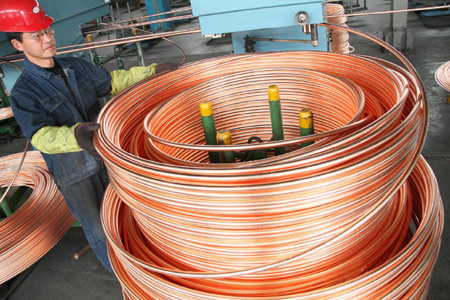-
News >Bizchina
Industrial metals edge up on yuan policy moves
2010-06-23 09:27
China's refined copper imports dropped by 4.3 percent in the first five months to 1.34 million tons.[China Daily]
BEIJING - Industrial metals extended gains on Tuesday in Shanghai, amid expectations that a more flexible yuan would boost China's imports of copper and zinc.
Zinc for September delivery on the Shanghai Futures Exchange rose by 360 yuan, or 2.49 percent, to close at 14,810 yuan per ton with a trading volume of 4,522 lots on Tuesday. It jumped by a daily limit of 5 percent on Monday.
Shanghai copper for September delivery edged up by 0.25 percent to 52,840 yuan per ton, on hopes that China, the world's largest consumer of the metal, will increase imports.
The People's Bank of China, or the central bank, on Sunday said it would push ahead with the yuan exchange rate mechanism reform, a move expected to end the currency's peg to the US dollar and lead to its gradual appreciation.
"Futures traders are very sensitive to policy shifts on the currency rate exchange ... and the performance of zinc and copper to some extent magnifies the impact of the change that lead to the consecutive surge," said Wang Jianchao, a non-ferrous analyst with the Shanghai-based Dahua Futures Research.
The government's statement on the exchange rate signaled the policymaker's confidence in the Chinese economy and also indicated the future demand growth for metals, analysts said. They added that the possible hot money inflows would trigger a speculative wave in the commodity market.
China is the largest consumer of zinc and imported 122,944 tons of refined zinc between January and May this year. But the figure is still 70.2 percent lower compared with last year.
Zinc prices have dipped to a low in early June on concerns that demand was shrinking in China.
The nation's refined copper imports dropped by 4.3 percent in the first five months of 2010 from a year earlier to 1.34 million tons, according to the General Administration of Customs.
"Manufacturers' desire to buy metals from abroad will become much stronger if the yuan's purchasing power increases," said Chen Yue, an analyst at Shanghai CIFCO Futures Co Ltd.Morgan Stanley expects China's demand for zinc to surpass domestic output in the next two years, with the nation set to become a net zinc importer by 2012, according to Interfax.
China's exchange rate reform is a gradual, long-term process... the impact on the market in the short term will wane in a month, said Wang.
Barclays Capital said in a recent research note that it expects about a 5 percent appreciation in the real effective exchange rate in the next 12 months. "A moderate trend of appreciation is likely to be a policy objective," it said.
